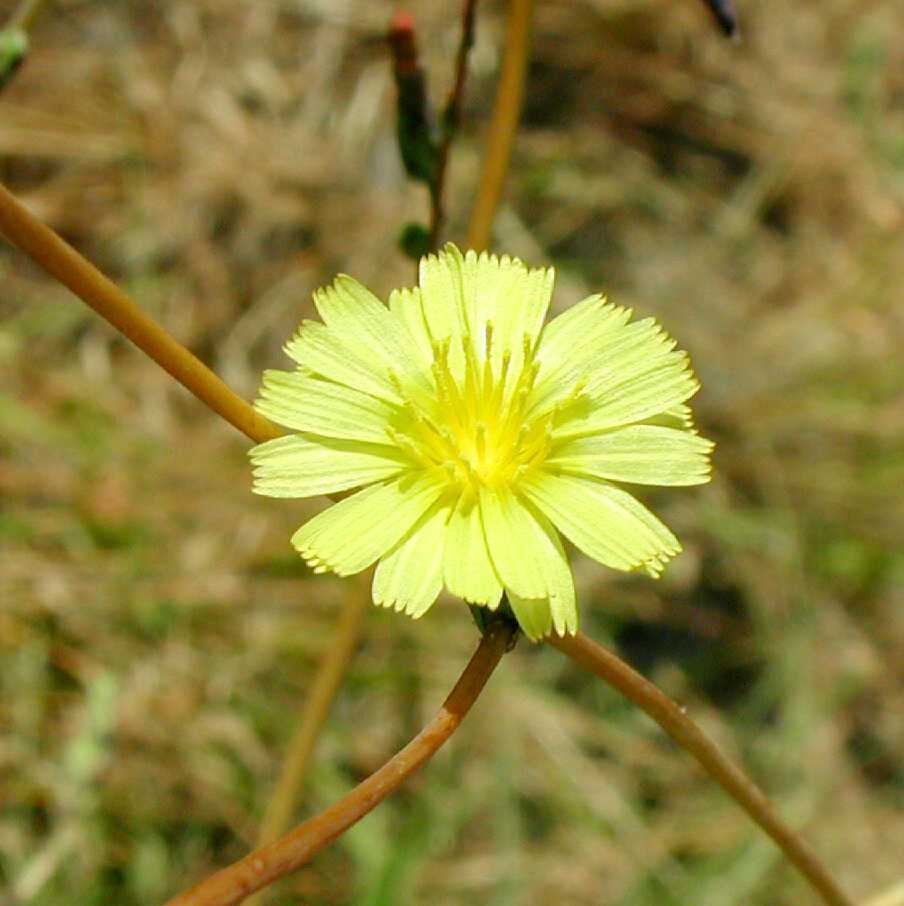Lactuca
|
Family: Asteraceae |
Annuals or biennials, 15-450+ cm; taprooted. Stems usually 1, usually erect, branched distally or throughout, glabrous or hairy (sometimes hispid to setose). Leaves basal and cauline or mostly cauline (at flowering); sessile or petiolate; blades orbiculate, ovate, oblong, or lanceolate to oblanceolate, linear, or filiform, margins entire or denticulate to pinnately lobed (faces glabrous or hairy, often ± setose). Heads borne singly or in corymbiform to paniculiform arrays. Peduncles not inflated distally, sometimes bracteate. Calyculi of 3-10+, deltate to lanceolate bractlets in 2-3 series (sometimes intergrading with phyllaries). Involucres campanulate to cylindric, 2-5[-8+] mm diam. Phyllaries 5-13+ in ± 2 series (erect or reflexed in fruit), lanceolate to linear, usually subequal to equal, margins sometimes scarious, apices obtuse to acute. Receptacles flat to convex, pitted, glabrous, epaleate. Florets 6-50+; corollas yellow, bluish, or whitish. Cypselae reddish brown, tan, whitish, or purplish to blackish, bodies compressed to flattened, elliptic to oblong, beaks stout (0.1-1 mm, gradually or weakly set off from bodies) or filiform (2-6 mm, sharply set off from bodies), ribs 1-9 on each face, faces often transversely rugulose, usually glabrous; pappi persistent (borne on discs at tips of cypselae or beaks), obscurely double (spp. 1-2), each a minute, erose corona 0.05-0.2 mm subtending 40-80+, white or fuscous, ± equal, barbellate to barbellulate bristles in 1-2 series, or simple (spp. 3-10) of 80-120+, white, ± equal, barbellulate to nearly smooth bristles in 2-3+ series. x = 9. The common head and leaf lettuces of home gardens and commerce are derived from Lactuca sativa.
Fls all ligulate and perfect, yellow, blue, or white, the cor- tube generally more than half as long as the ligule; invol cylindric, often broadened at the base in fr, generally imbricate, occasionally merely calyculate; achenes compressed, winged or strongly nerved marginally, with 1 or several lesser nerves in each face, beaked or sometimes beakless, but in any case expanded at the summit where the pappus is attached; pappus of 2 rows of usually equal capillary bristles, none markedly coarser than the others; lactiferous herbs with alternate, entire to pinnatifid lvs and usually numerous heads with relatively few fls (5-56 per head in our spp.), the infl mostly paniculiform. (Mulgedium, Mycelis) 50, Eurasia, Afr., and N. Amer. Gleason, Henry A. & Cronquist, Arthur J. 1991. Manual of vascular plants of northeastern United States and adjacent Canada. lxxv + 910 pp. ©The New York Botanical Garden. All rights reserved. Used by permission. |

